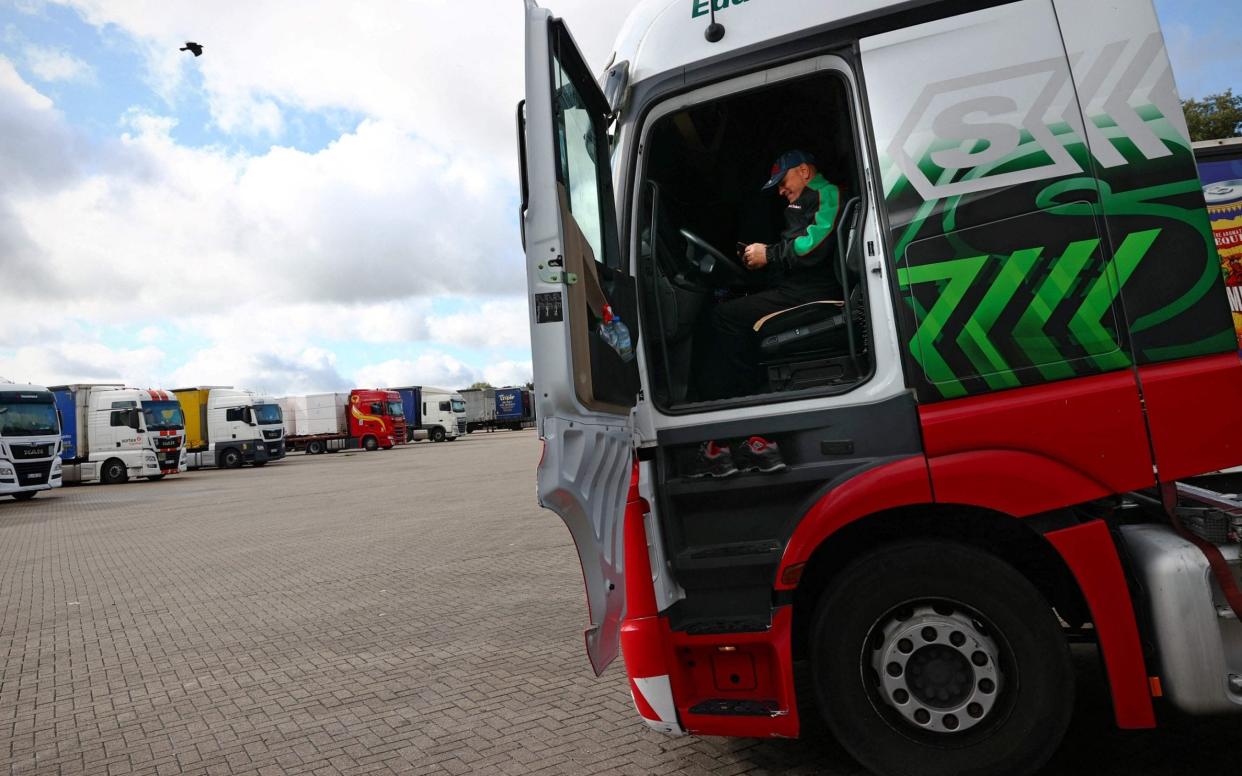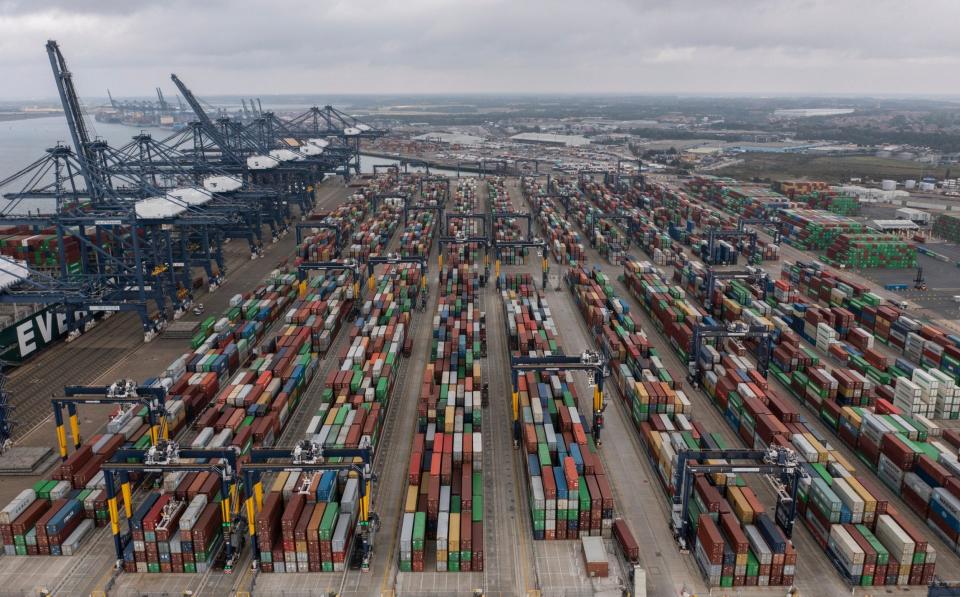Unions ‘holding Christmas hostage’

Union leaders have been accused of threatening to "hold Christmas hostage" after they raised the prospect of co-ordinated lorry strikes unless drivers are granted higher pay and better conditions.
Unite, the UK’s largest union, has threatened to launch the largest lorry drivers’ strike since the Winter of Discontent in 1979 by balloting thousands of supermarket and delivery drivers on a mass walkout.
Union bosses said the supply chain crisis had given lorry drivers the “power” to hold the country to ransom amid increasing fears that Christmas will be ruined by empty shelves and food shortages.
On Thursday, a spokesman for the Department for Transport accused unions of threatening to “hold Christmas hostage”, adding that any mass walkout would “damage the work being done to restore supply chains at this vital time of year”.
Adrian Jones, the national officer for road transport at Unite, which represents around 50,000 HGV drivers including those for major supermarkets such as Tesco and Sainsbury’s, said drivers were demanding a “firm commitment” from the Government to provide more truck stops with clean toilets and catering facilities.
Unite is also demanding that haulage firms offer fair and equal pay for long-serving drivers, with new starters now being offered salaries of up to £50,000 a year, as well as an end to temporary rules allowing drivers to work up to 10 hours a day.
“Drivers have had enough,” Mr Jones told the Telegraph. “Our members need proper facilities, fair pay and respect. HGV drivers are the blood in the body of our economy. We will not hesitate to cut that supply off if the Government and the employers refuse to do what is necessary.
“We have made this point to ministers and officials repeatedly – but they have not made any firm commitments, even though they know what needs to be done.”
Mr Jones said the “law currently prevents us from launching a national strike”, as unions are required to register disputes with individual employers. But he said union leaders were discussing plans to sidestep the rules by coordinating strikes across the sector to cause maximum disruption.
“We are now looking at coordinated strikes before January if we do not get those commitments from the Government and employers. We will not shy away from that,” he added.
“Clearly the fragility of the supply chain is an opportunity for us. Our members are now in the driving seat. They have the power. That’s why they are more confident and brave in their demands.”
It comes after Sharon Graham, Unite’s new leader, vowed to operate “on the edge of the law” to defend her members’ interests after winning the race to succeed Len McCluskey in August. In recent weeks, the union has declared a series of victories over pay and conditions as the HGV driver crisis has worsened.
On Thursday, the union announced it had secured a “significant” pay rise for hundreds of lorry drivers employed at one of Sainsbury’s main distribution hubs after threatening strike action. Staff at the DHL site near the Dartford Crossing, which supplies the supermarket chain, had vowed to walk out in a dispute over pay.
Meanwhile, Unite-backed strike action among HGV drivers at Tesco-owned wholesaler Booker Retail Partners – which supplies 1,500 convenience stores across London and the South East – was suspended on Oct 1 after a new pay deal was put on the table.
This week, Unite also said it had secured a victory for drivers on a Heinz distribution contract in Wigan, with many seeing their earnings increase by over 25 per cent.
In Brighton, bin lorry drivers backed by the GMB union have vowed to strike for another two weeks over pay, with rubbish piling up in the streets. At a council meeting on Wednesday, Conservative councillor Joe Miller accused the union of holding the city “over a barrel”.
“Ultimately in my view, the GMB are holding a gun to our head,” he said, according to a report in Brighton & Hove News. “They’ve got us over a barrel. It’s blackmail. I’ve never known anything quite like it. We’re not talking small pay rises. These are significant pay rises. Those are the actions of blackmail and terrorism because terrorists do exactly the same, and blackmail is exactly the same.”
Any co-ordinated strike action by lorry drivers across the country would be likely to be the largest since January 1979, when more than 1.7 million workers took action against James Callaghan’s Labour government and eventually won pay increases of up to 20 per cent. Today, only around 15 per cent of the 320,000 HGV workers in the UK are unionised.
A government spokesman said: “It would be reckless for unions to hold Christmas hostage and damage the work being done to restore supply chains at this vital time of year. We have already taken immediate action to increase the supply of HGV drivers, streamline the testing process and improve working conditions.
“We are pleased employers are working towards long-term solutions through improved testing and hiring, with better pay and working conditions, and will continue to support them to do so.”
Meanwhile, Rishi Sunak insisted there will be a “good amount of Christmas presents available” this year despite supply chain problems. The Chancellor’s comments came after meeting with finance ministers from the G7 group of leading world economies to talk about the situation, with the politicians agreeing to work more closely to solve the crisis.
Speaking to the BBC in Washington DC, he said: “We're doing absolutely everything we can to mitigate some of these challenges. They are global in nature so we can't fix every single problem, but I feel confident there will be good provision of goods for everybody. I’m confident there will be a good amount of Christmas presents available for everyone to buy.”
Retailers have expressed fears that ongoing supply chain problems will result in higher prices and empty shelves into December, but the chief executive of the UK Major Ports Group said chains were “robust” and there was “no need to panic”.

A build-up of cargo in Felixstowe has led to Maersk, the shipping company, opting to divert vessels away from the Suffolk port, while similar logjams have been seen elsewhere in the world, including in the US.
Meanwhile, Dominic Cummings has accused Boris Johnson of shelving plans to protect the supply chain in the wake of the Covid pandemic. Mr Cummings claimed the Prime Minister “actively chose” not to reshape Downing Street to deal with a future energy crisis or shortage of fuel.
Writing on social media, the former chief adviser said he had begun work with officials last spring on “Project Defend”, a plan to beef up the UK’s resilience to global economic shocks, but claimed the plans were “downgraded” after his departure from Downing Street in November.

 Yahoo News
Yahoo News 
